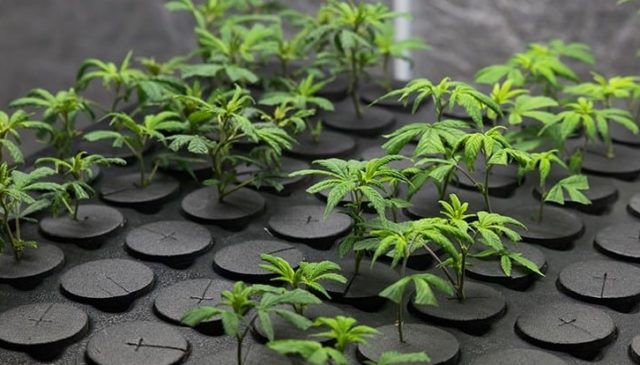
New Jersey, despite its left-leaning politics and proximity to one of the world’s largest urban centers, has lagged behind in cannabis. As the 11th-largest state in the country by population, New Jersey has fewer than 14 medical cannabis dispensaries serving close to 100,000 patients. Possession of marijuana was just decriminalized there last year.
Garden State cannabis also has a racial equity problem. Black residents are between two and three times more likely to be arrested for possession of marijuana despite relatively equal rates of use across races. In some counties, Black people are arrested over 30 times more frequently for cannabis, according to a 2020 report from the ACLU of New Jersey.
New Jersey passed legalization in November’s election by a landslide—more than two in three voters approved. But state cannabis advocates are now calling out serious shortcomings in the proposed A-21/S-21 bill, saying it doesn’t do enough to address the harsh repercussions of the drug war and will keep minority and disadvantaged small businesses from participating in the upcoming industry.
What’s in (and not in) A-21/S-21?
“[The bill] has been introduced as the most progressive cannabis legislation in the country yet it falls short of substantive social equity provisions seen in other states,” said Jessica Gonzalez, General Counsel for Minorities for Medical Marijuana (M4MM), in an email to Cannabis Business Times and Cannabis Dispensary.
“The bill is riddled with vague language and predatory programs aimed at minority communities while increasing the barriers to entry,” said Gonzalez. Specifically, she identified five points where it falls short:
-
Lack of allocation of cannabis tax revenue to communities harmed by prohibition. For contrast, consider Illinois, where the Restore, Reinvest, and Renew program (R3) uses 25% of state cannabis tax revenue to provide community grants.
-
Limited definitions of “impact zones.” These are defined as cities or towns with 120,000 or more residents who rank in the top 40% of cities with the most arrests for possession. Dispensaries will open in these areas first, and some lawmakers have suggested allocating tax revenue from cannabis to impact zone grants.
-
Specifically earmarking tax revenue for law enforcement training. The bill includes language that would use cannabis tax money to train designated police officers as “Drug Recognition Experts,” who will serve to “detect, identify, and apprehend drug-impaired motor vehicle operators.”
There are other issues. Brandon McKoy, president and chief executive at the New Jersey Policy Perspective, recently wrote that the bill’s proposal to allow just 28 state cultivation licenses would “undermine racial equality and privilege larger corporations at the expense of other applications.”
Gonzalez urged the state to go further in defining qualifications for social equity. “The statute must explicitly outline the requirements for a ‘social equity applicant’ and statutorily mandate the Cannabis Regulatory Commission to create a social equity program to assist these communities in the areas of technical assistance, financial assistance, education, etc.
“In the same vein, the statute must also mandate that a portion of the tax revenue collected be specifically earmarked for the funding of equity programming within the Office of Minorities, Disabled Veterans and Womens Cannabis Development,” she added.
“New Jersey lawmakers have shown they have not really looked at the failures and shortfalls of other states’ attempts to provide reconciliation and equity to those harmed by the war on drugs,” said Tauhid Chappell, executive board member at the Philadelphia Association of Black Journalists and founder of the CannAtlantic cannabis conference.
Chappell also pointed out the legislation’s optional Social Equity Excise Fee, a sliding scale in which the fee goes up as the price goes down, an appetizing condition for large MSOs with the corporate cash reserves to absorb these taxes.
What happens next?
The situation is still developing. According to NBC Philadelphia, New Jersey’s State Assembly and Senate both canceled meetings scheduled for Monday, Nov. 23, that were partially devoted to ironing out these issues. The next scheduled legislative meeting is Dec. 7.
In the meantime, those working to provide fair access to everyone in the state are seeking help.
“I am asking them [New Jersey residents] once again to use their voice to speak up against the lack of social equity initiatives in the proposed legislation,” said Gonzalez. “There will be additional Senate and Assembly Committee meetings in the upcoming weeks where folks will have the opportunity to provide oral or written testimony.”
“We need a lot of help and support here,” agreed Chappell. “The window is limited.” He encouraged residents in existing recreational cannabis markets to provide testimony to help lawmakers in New Jersey avoid making the same social equity mistakes made in their state.
“This is not the time to kick back and wait for legalization to come,” advised Gonzalez. “This is the time to get louder with our demands to ensure legalization is equitable. … I highly recommend reviewing the video of the Assembly Committee meeting that took place on November 9th available on the state legislative website. It’s time we all step into the arena.
